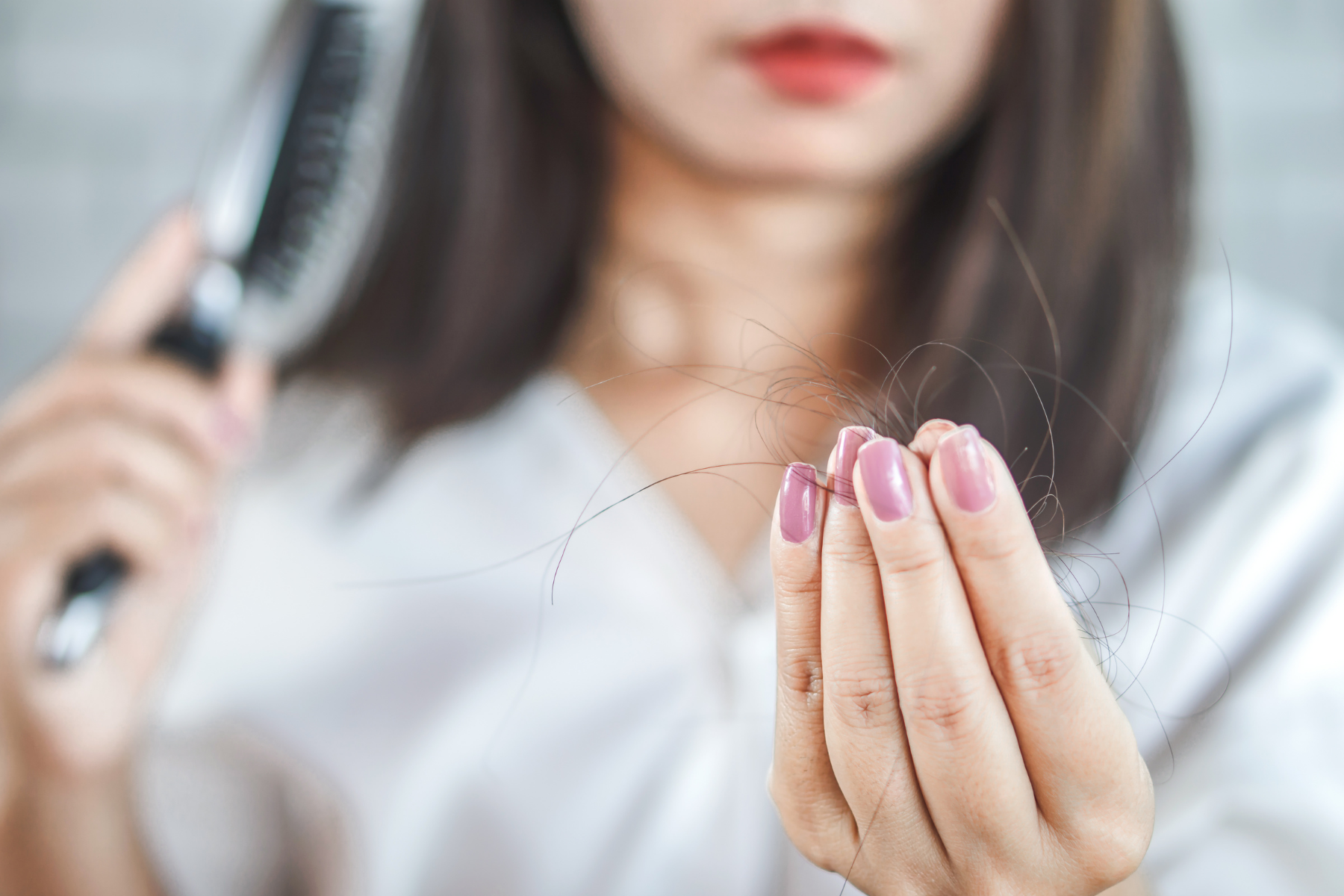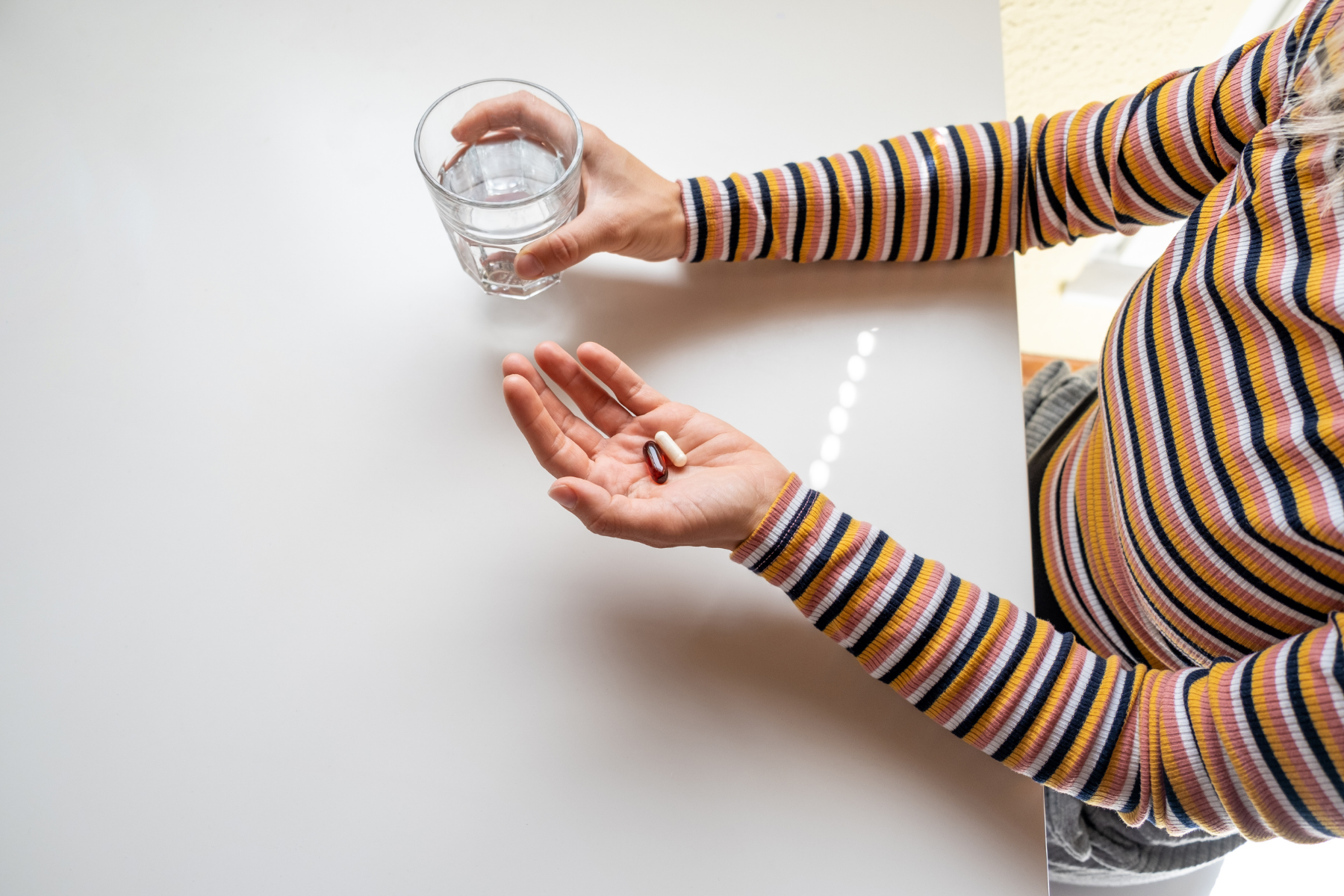Women Hair Loss: What You Need to Know and How to Fix It
Hair loss, also known as alopecia, can be frustrating as heck for women to deal with, especially for women with hormone imbalances such as PCOS. While it’s normal for people to shed between 50 to 100 single hairs per day, it’s not normal when more hair falls out than grows back in… or we suddenly feel like we’re shedding a lot more. Understanding the cause behind your hair loss can help determine the treatment. Let’s break down what you need to know when it comes to hair loss in women, what you need to know, and how to fix it.
This is a pretty long resource. Jump to the section that most interests you!
What Are Some Signs of Hair Loss in Women?
So how do you know you are experiencing excessive hair loss? Some signs of hair loss in women to look out for include seeing an abnormal amount of hair falling out daily either when you brush your hair, or when you wash your hair in the shower. If you’re noticing a ton of hair on your bed or around your house, or you’re noticing thinner areas of hair, particularly on top of your scalp, then this would be another cause for concern. Another sign is smaller, thinner ponytails or hair breaking off.
Remember, it’s completely natural for you to lose some hair every day. Don’t start freaking out just because a couple more hairs are on your brush than usual!
Hair Loss in Women with PCOS
Women with PCOS often experience hair growth where they don’t want to see it and hair loss where they don’t want it! Can you relate?! Hair loss for women with PCOS is usually due to excess androgenic hormones, aka male sex hormones. This can also lead to acne, thinning hair, hair growth on the face or body, or hair that easily becomes dry and damaged.
If you know you have PCOS and are tired of dealing with your symptoms flaring up (including hair loss), then it’s time to check out my top-rated signature programs!
Other Reasons For Excessive Hair Loss
There are multiple reasons for hair loss in women from hereditary to medical conditions and hormonal changes. Here are some reasons to discuss with your doctor before opting for expensive hair loss treatment solutions.
Adrenal Dysfunction
Cortisol, our stress hormone, is made in the cortex of the adrenal glands, which in turn controls a ton of different hormones in our body including controlling the body’s blood sugar levels and regulating metabolism. Since extended stress leads to a longer period of higher cortisol levels, this keeps the adrenal glands from making more of the hormones that support healthy hair growth.
Insulin Resistance
Insulin-resistant type PCOS is the most common type of PCOS. These elevated insulin levels in women can cause excessive production of male hormones (androgens). When this happens, hair loss on the scalp is more likely to occur in women, which resembles male pattern baldness.
Hypothyroidism
An underactive and overactive thyroid can cause scalp hair loss. Another big indicator of hair loss and present in a lot of autoimmune and hormone imbalance conditions is inflammation. The inflammation present can cause hair loss even if thyroid hormones are normal in a blood test.
Women Going Through Menopause
With age usually comes menopause for women, and some women experience hair loss due to the sudden or gradual decline in estrogen and progesterone. Keep in mind that genetics also plays a role in hair loss, so not all women will experience significant hair loss with age going through menopause.
Postpartum Hair Loss
After childbirth, many women experience hair loss because of the shift of hormones after pregnancy. Typically this happens around the four to six-month mark and usually lasts around three months. Pregnancy pushes the hair into a “growth” phase and when this ends, many new mothers notice a ton of hair loss. Because postpartum hair loss is usually temporary, if you’re noticing it for more than a few months, you may want to get your thyroid levels checked.
Nutrient Deficiencies
Hair loss in women can often be due to nutrient deficiencies, which can go hand in hand with those pesky hormone imbalance cases we talked about above. For example, being low in iron and B vitamins can cause scalp hair loss
Are you not sure where to start on your journey? Check out my dutch hormone testing package. This is a great way to uncover the root cause of your hair loss!
Natural Remedies For Hair Loss in Women
When it comes to how to reverse hair loss for women, a lot of solutions stem from managing your symptoms of the underlying cause of why you experience the hair loss in the first place. This often includes optimizing your lifestyle choices and eating habits.
Here are some natural ways of reversing hair loss for women:
Supplements
Once you understand the underlying cause of your hair loss concerns, then it’s time to optimize your diet and check your vitamins and minerals. Once you find out what your nutrient deficiencies are, you can supplement where you can’t with your diet. I always recommend teaming up with a dietitian for this part (hey, girl hey!).
Herbal Remedies
There are a ton of natural herbs that may help combat excess androgen levels, inflammation, and improve insulin resistance. Some herbal teas or supplements to check out include white peony, licorice tea, spearmint tea, and fenugreek seeds.
Lower Insulin Levels
High levels of insulin are the root cause of hair loss in many people with PCOS. To improve your insulin levels, you’ll have to focus on your diet. Make sure every meal has a good amount of protein and fiber paired with your carbs!
Reduce Processed Foods and Reduce Intake of Foods High in Sugar
Eating a healthier, balanced diet improves a lot of concerns when it comes to autoimmune diseases and hormone imbalances linked to hair loss in women. This doesn’t mean you can never eat a piece of cake again, but it means being a bit more mindful of how often you eat it. This also means incorporating more veggies and protein in your meals, versus just carb overloading.
Follow me on Instagram for more ideas on how to have a more balanced diet!
Stress Management
We are all familiar with stress, and stress often aggravates all other symptoms that come with hair loss. A great way to not only work on improving your hairline is to improve your self-care routines too. Take more breaks during work if you’re feeling overwhelmed, go outside for some natural vitamin D, or invest a little bit of time every day doing something you love.
Other Solutions For Hair Loss
Sometimes optimizing your health and lifestyle isn’t really enough to see thicker and healthier hair. Here are some other solutions for you to consider on your hair loss recovery journey:
PRP Injections
Platelet-rich plasma therapy hair loss is a 3-step medical treatment where a person's blood is drawn, processed, and then injected into their scalp. This may help trigger natural hair growth by increasing blood supply to the hair follicle.
Rogaine or Nutrafol
There are topical and oral solutions to help with overall hair loss. Both of these work by prolonging the growth phase of the hair follicles.
NBR extensions
Natural Beaded Row is a hair extension method that does not use glue, tape, or heat. It's the most natural and lasts 6 months to 1 year.
Best Supplements For Women's Hair Loss
One main question I always get in my inbox is “what are the best supplements I should be taking?” While I can recommend a ton of amazing supplements, it’s important to remember that supplement recommendation really depends on your personal needs and deficiencies. I highly recommend getting a full hormone panel done, or asking your doctor for more guidance.
Here are some of the best supplements for women’s hair loss:
Collagen
Rich in amino acids, collagen helps your body to build keratin, which is the protein that makes up the hair. Collagen can also act as an antioxidant and fight damage caused by free radicals from stress, air pollutants, alcohol, and other environmental factors.
Biotin (vitamin B7)
This is important for cells inside your body. If you have low levels, you can experience hair loss, skin rashes, and brittle nails. Your biotin levels may also be low if you’re currently pregnant, breastfeeding, or taking certain antibiotics.
Zinc
Can play an important role in making proteins in your hair. Your body can’t naturally make it, so you need to get it from food and supplements. If you have low zinc levels then you may want to add shellfish, meat, beans, nuts, and seeds into your diet!
Vitamin D
Plays a role in stimulating new and old hair follicles. If you don’t have enough vitamin D in your body, new hair growth may be stunted. Good food sources are natural sun exposure, egg yolks, and salmon.
Magnesium
One of my favorite supplements to combat stress! Magnesium plays an important role in promoting follicle hair growth for gorgeous healthy hair. So if you’re feeling stressed lately, then it’s time to add magnesium into your diet. Avocados, chia seeds, bananas, and dark chocolate are great ways to up your intake.
Ovasitol
This supplement is for my PCOS cysters! Inositol helps reduce testosterone and improve insulin resistance in women with PCOS. This can thus help reverse thinning hair! Click here for 10% off!
Did you know I’m releasing my own supplement line that can help reverse PCOS hair loss!?
Hairstyles and Hair Care for Women With Hair Loss
When it comes to healing from hair loss, we want to take care of our hair y’all! These tips don’t necessarily promise hair growth, but these tips are key to maintaining your luscious locks.
Avoiding Hairstyles That Will Pull Your Hair
You want to avoid tight ponytails and overall hairstyles that pull your hair back for long hours. Constantly pulling your hair back into these hairstyles will most likely make your hair loss worse. Instead, opt for low-maintenance hairstyles and use hair-friendly hair scrunchies or bandanas to keep your hair out of your face.
Deep Conditioning Weekly
This helps reduce breakage and split ends, adding to your hair's overall health. I use Arvazallia and squirt on Its a10 haircare daily
Stop Dyeing Your Hair
I know I know, this one breaks my little heart too, but hair color can damage your hair even further so you might try goin' all-natural!
Get Regular Trims
Getting a trim helps maintain your hair's overall health by getting rid of dry, split ends and may encourage more growth.
As you can see, hair loss in women can be a bit tricky. There can be multiple reasons for your hair loss happening, and it’s important to be patient with yourself. What questions do you have about hair loss and overall hair loss recovery? I’m here to help!





